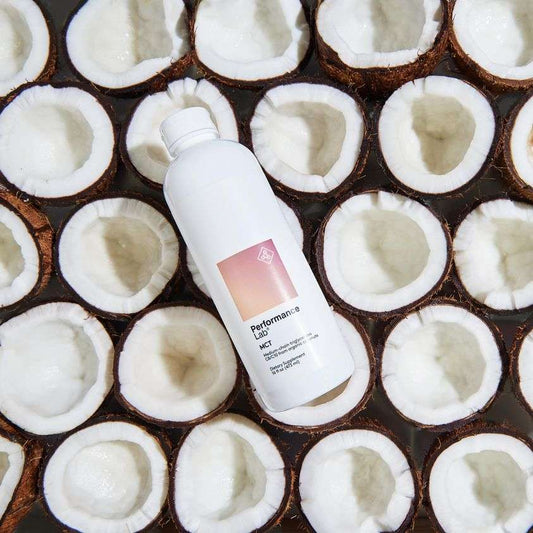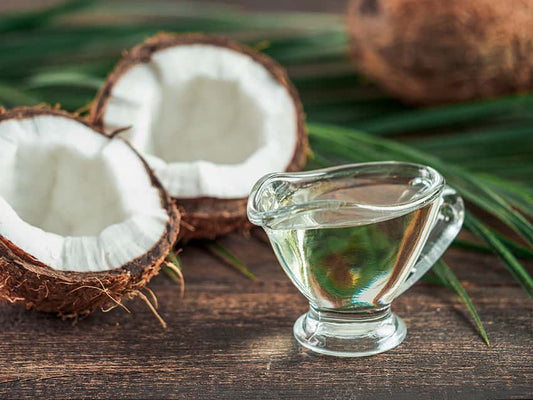If you've read any sort of health publication in the last few years, you've more than likely heard about MCT oil in your coffee.
Popularized as "Bulletproof coffee" by Dave Asprey, or any other name—fatty coffee, keto coffee, butter coffee etc.—it's the craze of adding MCT oil, and sometimes grass-fed butter, to your morning brew.
And while it may sound a bit weird, it's actually quite delicious - especially when you use a high-quality MCT oil.
What Is MCT Oil?
Medium-chain triglycerides are fatty acids isolated from coconut or palm kernel oil through a process called fractionation.
These are fats comprising six to twelve carbon backbones, with most fats in MCT being C8 and C10 carbons (caprylic and capric acid, respectively).
Most MCT oils are either 100% pure caprylic acid or 100% pure capric acid, but you will also find some as a mix of both.
MCTs v LCTs
We're all familiar with the coconut oil craze, but lately, MCT has gained a lot of attention in the keto and low-carb world.
This is all because of the specific way that MCTs are metabolized, and there are a few key differences you should know that will give you some understanding of why MCTs are seen as superior to other forms of triglycerides 1:
MCTs (medium-chain triglycerides)
- 6-12 hydrocarbons
- Water-soluble
- 8.3 calories per gram
- Do not stimulate CCK (a hormone involved in regulating stomach content release)
- Do not require bile or pancreatic enzymes for digestion
- Directly absorbed into portal circulation bound to albumin
- Do not require carnitine for transport into mitochondria
- Less storage in adipose tissue
LCTs (long-chain triglycerides)
- 13-21 hydrocarbons
- Lipid soluble
- 9.2 calories per gram
- Stimulate CCK
- Require bile or pancreatic enzymes for digestion
- Must be incorporated into micelles, then chylomicrons for entry into the lymphatic system
- Require carnitine for transport into mitochondria
- More storage in adipose tissue
The two points in bold for each triglyceride are what you really want to focus on and understand because they explain all the hype associated with MCTs.
For long-chain fatty acids, or long-chain triglycerides, to be digested, they must go through the digestive system where they are taken up by specific transport molecules; without these molecules, they cannot enter circulation.
MCTs, on the other hand, bypass the entire digestive system and are absorbed directly from the stomach into the portal circulation and straight to the liver. Here, they are preferentially oxidized and utilized as an immediate energy source.
The Benefits of MCT Oil
1. Provides a clean, sustained release of energy
Compared to long-chain fatty acids, the reduced chain length of MCTs means they are more rapidly absorbed and metabolized by the body, specifically the liver, providing a more immediate source of fuel.
The result of this accelerated metabolic conversion is that rather than being stored as fat, the calories from MCTs are converted into fuel for immediate use by organs and muscles.
You may be wondering how they do this?
Their energy-boosting properties are attributed to their ability to cross the double mitochondrial membrane quite rapidly and do not require the presence of carnitine to get inside the mitochondria, unlike LCTs.
2. May boost your athletic performance
This is one of the lesser-known benefits of MCT oil, but small amounts of research show that MCT could help boost physical activity.
In one specific study, participants were given either 6g of MCTs or a mix of MCTs and LCTs via food for 14 days; they were to perform cycle ergometer exercise at 60% peak O2 uptake (VO2) for 40 minutes, followed by a workload corresponding to 80% peak VO2 until exhaustion 2.
Results of this study showed that the group ingesting only MCTs had a longer time to exhaustion at a workload of 80% peak VO2, had lower blood lactate concentrations and RPE during exercise, and higher fat oxidation rates compare to the LCT group.
What does all this translate to? A potential for MCTs to favor fat burning for energy production and decrease blood lactate levels, thus allowing for more prolonged exercise before hitting exhaustion.
However, keep in mind that other studies have not yet confirmed these results, but it shows great potential for MCTs on athletic performance.
Taking MCT in your coffee may actually have double the benefits. The MCT increases your body's ability to burn fat, while the caffeine keeps you alert and enhances athletic performance.
Why wouldn't you want to take it before a workout?
3. It could help you lose weight
The potential for them to help you drop pounds is probably one of the most well-known benefits of MCTs through its ability to enhance thermogenesis.
Several studies show that the rate of oxidation (i.e. metabolism) of MCTs is 10-fold faster than that of LCTs and also produces a greater thermic and satiating effect compared to LCTs.
Researchers in one specific study found that leptin levels increased to a greater extent and for a longer duration after a breakfast containing MCTs compared to LCTs; remember, leptin is the hormone that is released after food consumption to suppress hunger.
What's more, they also found that PYY, a hormone found to induce satiation, was higher in groups that consumed MCTs, and postprandial glucose and triglycerides were lower with MCT consumption 3.
All in all, this study shows promise for MCT in aiding weight loss efforts by triggering the release of satiety signals more effectively than LCTs.
Other studies show that MCTs can decrease adiposity, body fat, and whole-body subcutaneous adipose tissue loss, reduce waist circumference, and significantly lower the rate of variation of body fat percentage 4.
4. May Improve Gut Health
Gut microbiota has long been used as a marker for metabolic health and risk of chronic disease development, and interestingly enough, MCT oil may help to improve the gut environment and reduce dysbiosis.
MCTs have been shown to have potent antimicrobial properties and reduce the proliferation of certain strains of fungus.
In one rodent study, researchers found that MCT improved gut integrity, modulated immune responses to LPS (lipopolysaccharide), and improved intestinal secretion of IgA 4.
Researchers of this study concluded that dietary MCT, taken alone or with other beneficial supplements like prebiotics or probiotics, could act as an anti-obesity agent by decreasing intestinal permeability and remodelling gut microbiota 4.
Remember that the effects on humans, however, as still not conclusive but there is potential.
5. May Keep Your Bowels Regular
This one can be both positive and negative when it comes to MCT and coffee.
You'd probably be surprised at the number of people who struggle with constipation, but adding MCT into your diet may help with that, especially in your coffee.
Certain compounds inherent to coffee and MCT, like caffeine and chlorogenic acid, combined with the mildly laxative effect of MCT oil, may help to move things along through your digestive system and keep your bowel movements regular 5.
Should I Add MCT To My Coffee?
The whole premise behind adding fat to your coffee is based on the idea that the fat keeps you full (especially during intermittent fasting) and the coffee keeps you energized and alert.
So, should you use MCT in your coffee?
This depends strictly on what you're looking for. If you're looking to reap the benefits of MCT, then it's a great addition.
However, while some people say that the fat helps to mute the impact of the caffeine (that increased alertness and energy), research shows that MCTs don't have a significant effect on caffeine absorption, or at least not enough to notice 6.
But here's why most people do: it provides sustained energy and wards off hunger.
While people often say that fat slows down the absorption of caffeine into your system, leaving you with a sustained released of energy, it's more likely that the MCT is contributing to the boost in energy because of its rapid metabolism and turnover in the liver.
That's because MCT is absorbed directly from the stomach, thereby bypassing the entire digestive system and providing a sustained source of clean energy.
How Much MCT Oil In Coffee?
As we've said before, you have to take it easy on the MCT oil if you're new to it, as too much can cause gastric emptying (diarrhea) and stomach pain or cramping.
Adding one teaspoon—and eventually working your way up to 1 tablespoon—of something like Performance Lab MCT to your morning coffee is a great and convenient way to keep you in ketosis (if you follow a keto diet), boost your energy, and keep your hunger in check.

Some people prefer to stir it into their coffee, while others like it blended. Simply brew your morning coffee, drop it in the blender, add the desired amount of MCT oil, and give it a whirl.
The result is a delicious, frothy coffee that can power you through your morning. And if you want a bit more, throw in some cinnamon to add a bit of spice and regulate your glucose levels!
References
- ND Shah, BN Limketkai. The Use of Medium-Chain Triglycerides in Gastrointestinal Disorders. Practical Gastroenterology. 2017 Feb; 160: 20-28.
- N Nosaka, Y Suzuki, A Nagatoishi, M Kasai, J Wu, M Taguchi. Effect of ingestion of medium-chain triacylglycerols on moderate- and high-intensity exercise in recreational athletes. J Nutr Sci Vitaminol (Tokyo). 2009 Apr;y 55(2): 120-5.
- MP St-Onge, B Mayrsohn, M O'Keeffe, HR Kissileff, AR Choudhury, B Laferrère. Impact of medium and long chain triglycerides consumption on appetite and food intake in overweight men. Eur J Clin Nutr. 2014; 68(10): 1134-1140.
- SA Rial, AD Karelis, KF Bergeron, C Mounier. Gut Microbiota and Metabolic Health: The Potential Beneficial Effects of a Medium Chain Triglyceride Diet in Obese Individuals. Nutrients. 2016; 8(5): 281.
- K Akimoto, M Inamori, H Iida, H Endo, et al. Does postprandial coffee intake enhance gastric emptying?: a crossover study using continuous real time 13C breath test (BreathID system). Hepatogastroenterology. 2009 May-Jun; 56(91-92): 918-20.
- Institute of Medicine (US) Committee on Military Nutrition Research. Caffeine for the Sustainment of Mental Task Performance: Formulations for Military Operations. Washington (DC): National Academies Press (US); 2001. 2, Pharmacology of Caffeine.















